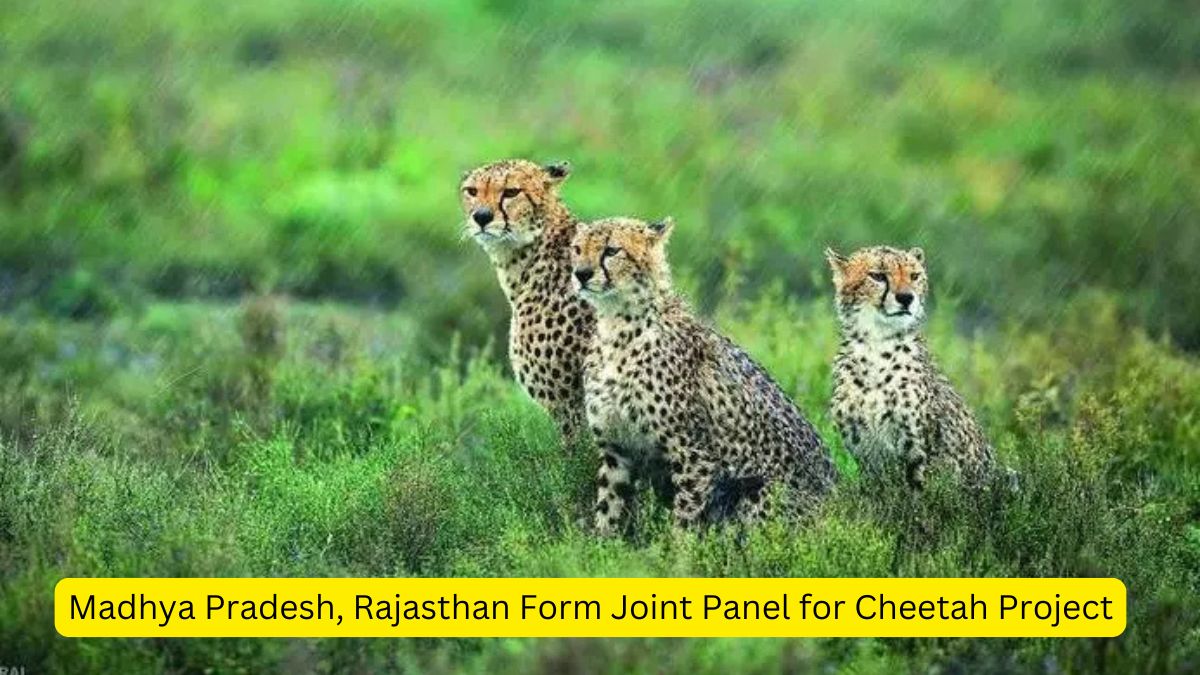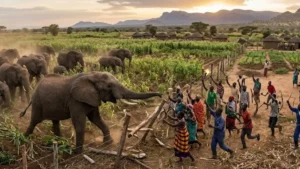In response to recent incidents of cheetahs from Madhya Pradesh straying into neighboring Rajasthan, a joint corridor management committee has been established between the two states. The committee’s primary focus will be on the conservation of these felines, ensuring the development of suitable habitats, and facilitating the future relocation of cheetahs from Madhya Pradesh’s Kuno National Park (KNP) and Gandhi Sagar Sanctuary.
Objective
- The formation of a ten-member joint committee by Madhya Pradesh and Rajasthan aims to develop and manage a cheetah corridor between the two states, ensuring safe movement of cheetahs.
Composition
- The committee consists of forest officers from both states, led by the Principal Chief Conservators of Forest (PCCFs) (wildlife) of Madhya Pradesh and Rajasthan.
Reason for Formation: The committee was established in response to incidents where cheetahs from Kuno National Park (KNP) in Madhya Pradesh strayed into Rajasthan, such as in May 2024 and December 2023.
Key Task: The committee is tasked with identifying the ‘Cheetah Conservancy Landscape’ in the corridor to facilitate the safe movement of cheetahs between the states.
Key Responsibilities and Tasks
Cheetah Conservancy Landscape Identification
- The committee will identify and designate areas suitable for the safe movement of cheetahs between Kuno National Park (KNP) in Madhya Pradesh and forests in Rajasthan.
- This includes establishing clear pathways to ensure minimal disturbance to the wildlife.
Long-Term Strategy
- Developing a long-term strategy for the cheetah corridor that prioritizes the safe passage of cheetahs.
- The committee will also formulate a Memorandum of Understanding (MoU) between Madhya Pradesh and Rajasthan for the feasibility study of corridor development.
Tourism and Conservation Collaboration
- The committee will explore joint tourism routes involving the National Chambal Gharial Sanctuary, connecting both states.
- It will also consider linking Kuno National Park in Madhya Pradesh with Ranthambore National Park in Rajasthan for integrated wildlife tourism.
Capacity Building
- The committee will suggest measures to enhance the capabilities of forest officers and frontline staff in monitoring, patrolling, and managing cheetahs that stray from Kuno.
- This will include training on how to manage and prevent cheetah movement outside designated corridors.
Habitat Improvement Measures
- Recommendations will be made for the improvement of habitats in both states, focusing on grassland development and prey base augmentation.
- These improvements will support the future migration of cheetahs from Kuno or the proposed second home for cheetahs in Gandhi Sagar Sanctuary.
Background of Cheetah Translocation Project
Translocation of Cheetahs
- In September 2022, eight cheetahs were translocated from Namibia to Kuno National Park, marking the first-ever intercontinental translocation of carnivores in India under the Cheetah Introduction Project.
- In December 2022, 12 more cheetahs were translocated from South Africa.
Current Status at Kuno National Park
- Following the translocation, the population at Kuno has grown to 24 cheetahs, including 12 cubs, despite some fatalities and successful births.
| Summary/Static | Details |
| Why in the news? | Madhya Pradesh, Rajasthan Form 10 members Joint Panel for Cheetah Project |
| Led by | Principal Chief Conservators of Forests (PCCFs) of both states. |
| Purpose | To develop and manage a cheetah corridor between Madhya Pradesh and Rajasthan for safe movement of cheetahs. |
| Background | Cheetahs from Kuno National Park (KNP) in Madhya Pradesh have strayed into Rajasthan (May 2023, December 2023). |
| Cheetah Translocation Background | 8 cheetahs were translocated from Namibia to Kuno in 2022, and 12 from South Africa in 2022. |
| Committee’s Key Responsibilities |
|
| Current Cheetah Population | Kuno National Park now has 24 cheetahs, including 12 cubs. |




 Project HANUMAN Launched to Address Grow...
Project HANUMAN Launched to Address Grow...
 Haryana Unveils ₹2.23 Lakh Crore Budget ...
Haryana Unveils ₹2.23 Lakh Crore Budget ...
 President Droupadi Murmu Launches 4 Majo...
President Droupadi Murmu Launches 4 Majo...








